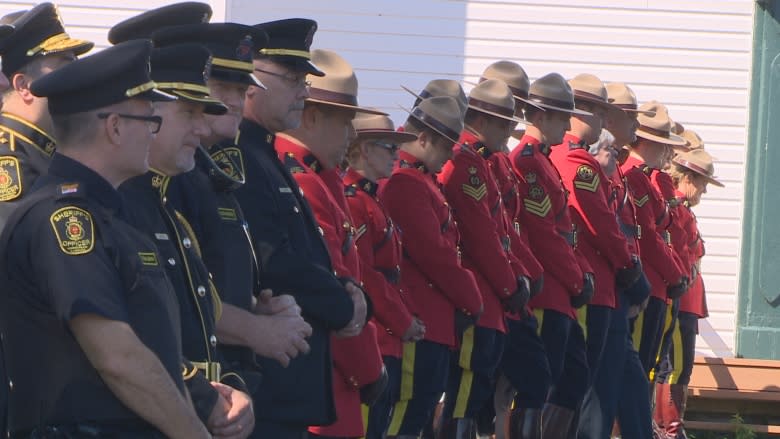Vacancies, budget cuts, stress: RCMP sources say it's all taking a toll in N.L.
It's been a very busy and trying time for the RCMP in Newfoundland and Labrador, and some officers are saying it's taking a toll on their health and morale.
"I've never seen so many vacancies. It's cruel," said one veteran officer who asked to remain anonymous.
There have also been a horrific spate of deadly traffic collisions, a large deployment to Labrador, and the death by suicide of a high-profile officer.
That's on top of budget cuts and what another Mountie said is the lowest number of officers available for frontline duty that he's ever seen.
"The province has never been in this shape," said the officer, adding that most of the 44 detachments in the province are under-strength, either because vacant positions have not been filled or because of a high number of officers on various types of leave, including stress leave.
A perfect storm?
Some are calling it a perfect storm.
Eighteen dead in seven weeks of carnage on the province's highways.
What some sources say was the deployment of more than 150 police officers from across Canada to Labrador in recent weeks to protect Muskrat Falls work from protestors. That cost to provincial taxpayers? About $10 million.
And the death by suicide of Cpl. Trevor O'Keefe, who was struggling with post-traumatic stress disorder, on Sept. 11.
It's all raising some serious questions about the mental health needs of first responders, and whether the deployment of so many officers to Labrador may have eroded highway enforcement efforts, perhaps contributing to some poor driving habits.
Deployment to Labrador not linked to deaths, says minister
"There was no linkage whatsoever between Muskrat Falls deployment and people being on the ground," Justice and Public Safety Minister Andrew Parsons asserted Wednedsay.
"In fact, to make up the force that went to Muskrat Falls we deployed officers from all over this country. So that is not linked whatsoever."
But Parsons acknowledged there are some big challenges, and was planning to take part in meetings Wednesday about strategies to increase police presence.
"I may not have the solution to how we fix issues like PTSD and mental health challenges that you face in these high-stress conditions. What I can say is I'd like to be a part of that solution to listen to what we can do and find a way to make things better."
Province pays 70 per cent of RCMP budget
Senior leadership with the RCMP, meanwhile, were not available for an interview, but CBC News obtained this breakdown of the force's staffing levels in this province.
There are 437 uniformed RCMP positions jointly funded by the provincial and federal governments, with the province picking up 70 per cent of the cost, or nearly $74 million this year.
About four per cent of these positions are vacant, while another eight to 10 per cent are on some form of leave.
That's more than 60 vacancies; not counting officers on the job, but not available to respond to calls for health reasons.
Some officers said that's causing added stress, and affecting morale, since in many cases these positions are not backfilled.
The more than $2.2 million cut from the RCMP budget this year is the equivalent to roughly 14 positions.
"The changes that they made have been in the background and certainly not when it comes to boots on the ground or people out on the highways and in towns and communities," said Parsons.
As for the deployment to Labrador, Parsons defended the cost.
"I'd like to think it was worth it in the sense that we didn't have anything happen similar to what happened last time," he said referring to protests in the fall of 2016 that temporarily shut down the Muskrat Falls project.




